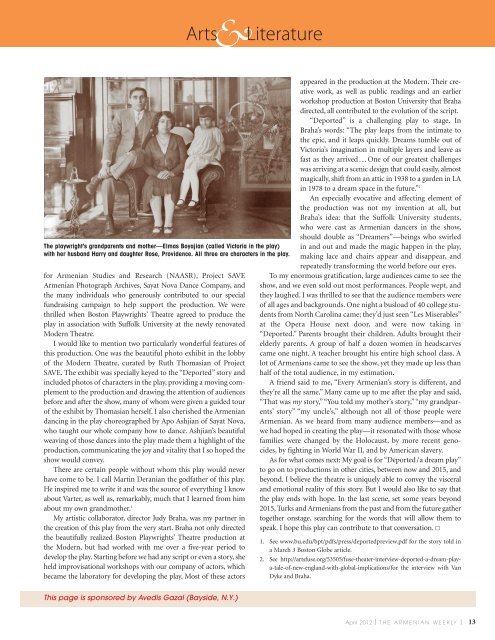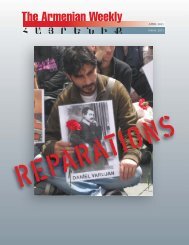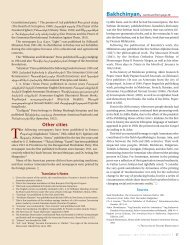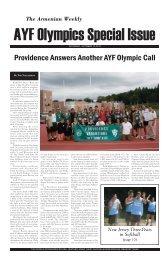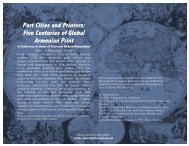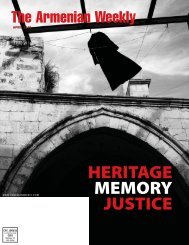Armenian Weekly April 2012 Magazine
Armenian Weekly April 2012 Magazine
Armenian Weekly April 2012 Magazine
Create successful ePaper yourself
Turn your PDF publications into a flip-book with our unique Google optimized e-Paper software.
Arts&<br />
Literature<br />
The playwright's grandparents and mother—Elmas Boyajian (called Victoria in the play)<br />
with her husband Harry and daughter Rose, Providence. All three are characters in the play.<br />
for <strong>Armenian</strong> Studies and Research (NAASR), Project SAVE<br />
<strong>Armenian</strong> Photograph Archives, Sayat Nova Dance Company, and<br />
the many individuals who generously contributed to our special<br />
fundraising campaign to help support the production. We were<br />
thrilled when Boston Playwrights’ Theatre agreed to produce the<br />
play in association with Suffolk University at the newly renovated<br />
Modern Theatre.<br />
I would like to mention two particularly wonderful features of<br />
this production. One was the beautiful photo exhibit in the lobby<br />
of the Modern Theatre, curated by Ruth Thomasian of Project<br />
SAVE. The exhibit was specially keyed to the “Deported” story and<br />
included photos of characters in the play, providing a moving complement<br />
to the production and drawing the attention of audiences<br />
before and after the show, many of whom were given a guided tour<br />
of the exhibit by Thomasian herself. I also cherished the <strong>Armenian</strong><br />
dancing in the play choreographed by Apo Ashjian of Sayat Nova,<br />
who taught our whole company how to dance. Ashjian’s beautiful<br />
weaving of those dances into the play made them a highlight of the<br />
production, communicating the joy and vitality that I so hoped the<br />
show would convey.<br />
There are certain people without whom this play would never<br />
have come to be. I call Martin Deranian the godfather of this play.<br />
He inspired me to write it and was the source of everything I know<br />
about Varter, as well as, remarkably, much that I learned from him<br />
about my own grandmother. 1<br />
My artistic collaborator, director Judy Braha, was my partner in<br />
the creation of this play from the very start. Braha not only directed<br />
the beautifully realized Boston Playwrights’ Theatre production at<br />
the Modern, but had worked with me over a five-year period to<br />
develop the play. Starting before we had any script or even a story, she<br />
held improvisational workshops with our company of actors, which<br />
became the laboratory for developing the play. Most of these actors<br />
appeared in the production at the Modern. Their creative<br />
work, as well as public readings and an earlier<br />
workshop production at Boston University that Braha<br />
directed, all contributed to the evolution of the script.<br />
“Deported” is a challenging play to stage. In<br />
Braha’s words: “The play leaps from the intimate to<br />
the epic, and it leaps quickly. Dreams tumble out of<br />
Victoria’s imagination in multiple layers and leave as<br />
fast as they arrived . . . One of our greatest challenges<br />
was arriving at a scenic design that could easily, almost<br />
magically, shift from an attic in 1938 to a garden in LA<br />
in 1978 to a dream space in the future.” 2<br />
An especially evocative and affecting element of<br />
the production was not my invention at all, but<br />
Braha’s idea: that the Suffolk University students,<br />
who were cast as <strong>Armenian</strong> dancers in the show,<br />
should double as “Dreamers”—beings who swirled<br />
in and out and made the magic happen in the play,<br />
making lace and chairs appear and disappear, and<br />
repeatedly transforming the world before our eyes.<br />
To my enormous gratification, large audiences came to see the<br />
show, and we even sold out most performances. People wept, and<br />
they laughed. I was thrilled to see that the audience members were<br />
of all ages and backgrounds. One night a busload of 40 college students<br />
from North Carolina came; they’d just seen “Les Miserables”<br />
at the Opera House next door, and were now taking in<br />
“Deported.” Parents brought their children. Adults brought their<br />
elderly parents. A group of half a dozen women in headscarves<br />
came one night. A teacher brought his entire high school class. A<br />
lot of <strong>Armenian</strong>s came to see the show, yet they made up less than<br />
half of the total audience, in my estimation.<br />
A friend said to me, “Every <strong>Armenian</strong>’s story is different, and<br />
they’re all the same.” Many came up to me after the play and said,<br />
“That was my story,” “You told my mother’s story,” “my grandparents’<br />
story” “my uncle’s,” although not all of those people were<br />
<strong>Armenian</strong>. As we heard from many audience members—and as<br />
we had hoped in creating the play—it resonated with those whose<br />
families were changed by the Holocaust, by more recent genocides,<br />
by fighting in World War II, and by American slavery.<br />
As for what comes next: My goal is for “Deported /a dream play”<br />
to go on to productions in other cities, between now and 2015, and<br />
beyond. I believe the theatre is uniquely able to convey the visceral<br />
and emotional reality of this story. But I would also like to say that<br />
the play ends with hope. In the last scene, set some years beyond<br />
2015, Turks and <strong>Armenian</strong>s from the past and from the future gather<br />
together onstage, searching for the words that will allow them to<br />
speak. I hope this play can contribute to that conversation. a<br />
1. See www.bu.edu/bpt/pdfs/press/deportedpreview.pdf for the story told in<br />
a March 3 Boston Globe article.<br />
2. See http://artsfuse.org/53505/fuse-theater-interview-deported-a-dream-playa-tale-of-new-england-with-global-implications/for<br />
the interview with Van<br />
Dyke and Braha.<br />
This page is sponsored by Avedis Gazal (Bayside, N.Y.)<br />
<strong>April</strong> <strong>2012</strong> | THE ARMENIAN WEEKLY | 13


